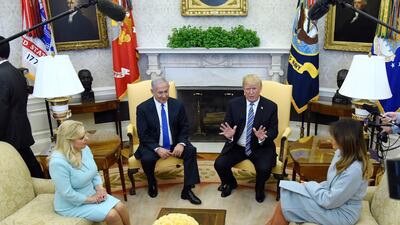Under twin clouds of legal investigations, the leaders of the United States and Israel pledged on Monday to further strengthen ties as President Donald Trump said he might travel to Jerusalem to preside over the May opening of a new US embassy.
Prospects for using such a trip to unveil his much-vaunted but still mysterious peace plan for Israel and the Palestinians were uncertain.
Hosting Israeli Prime Minister Benjamin Netanyahu at the White House, Mr Trump said his controversial decision to recognise Jerusalem as Israel’s capital and move the embassy from Tel Aviv to the holy city had improved chances for ending the conflict, despite Palestinians’ insistence otherwise.
The two steps enraged the Palestinians, who claim part of Jerusalem for the capital of an eventual state and accuse the US president of abandoning the US role of honest broker.
Monday’s meeting came as the leaders cemented an increasingly close relationship yet amid profound turmoil in the Middle East that threatens hopes of a resumption in Israeli-Palestinian negotiations and also attempts to restore stability in the volatile region.
Iran and its activities in Syria and Lebanon are of profound concern to Israel, and Mr Netanyahu made clear Iran is his highest priority.
His American counterpart said that despite their anger, “the Palestinians, I think, are wanting to come back to the table”. There was no apparent evidence for the assertion as the Palestinians are not even co-operating with US mediation right now.
Mr Trump said his Middle East team, led by his son-in-law Jared Kushner, was hard at work on a peace proposal that is nearing completion, even as Mr Kushner’s status is in limbo after losing his top secret security clearance.
The president said he had actually given peace hopes by removing Jerusalem as an obstacle in long-stalled negotiations that have collapsed under successive administrations of both political parties.
“Nobody could get past, No 1 Jerusalem,” he said. "We’ve taken it off the table. So this gives us a real opportunity for peace."
Mr Trump said he was looking into the possibility of making his second trip to Jerusalem as president in mid-May, when the embassy is slated to move into a temporary location that is now an annex of the US consulate. “We’re looking at coming,” he said. “If I can, I will.”
With Mr Netanyahu looking on, the president said he had rejected a $1 billion plan for a new embassy in favour of a temporary facility that would cost only $250,000. Eventually, however, that embassy would have to be expanded to accommodate more than a handful of diplomats.
The cost of an expansion likely would run in the hundreds of millions of dollars, based on construction costs for US embassies around the world.
For his part, the Israeli leader lavished praise on Mr Trump for the Jerusalem recognition and the embassy move, comparing him with the Persian king Cyrus, who allowed Jews to return to Jerusalem from Babylon 2,500 years ago; former British foreign secretary Arthur Balfour, who signed a declaration in 1917 supporting the creation of a Jewish state in what was then the British mandate of Palestine; and president Harry Truman, the first world leader to recognise Israel in 1948.
For all the warmth and bonhomie, misgivings are percolating under the surface over Iran, where Israel sees Mr Trump’s efforts to date to crack down on the Jewish state’s arch-enemy as lacking.
He has vowed to pull out of a 2015 nuclear deal with Iran in mid-May unless the US and Europe agree on sanctions that would punish Iran for activity not covered by the accord or, in some cases, would be eventually permitted under its terms.
Israeli officials are concerned Mr Trump may not demand enough, particularly on Iran’s ballistic missile program, and are wary the administration may be acquiescing to Iran’s growing presence in Syria and influence in Lebanon — two Israeli neighbours.
Mr Netanyahu arrived in the US over the weekend as Washington was gearing up for the annual conference of AIPAC, the powerful pro-Israel lobby, that will give him a respite from swirling legal troubles at home.
He and his wife were questioned separately by police for hours on Friday in a pending corruption case before his departure for Washington. Just before meeting with Mr Trump on Monday, Israel police announced that a Netanyahu confidant had agreed to turn state’s witness in the burgeoning case.
Mr Netanyahu will speak to the AIPAC conference on Tuesday.

